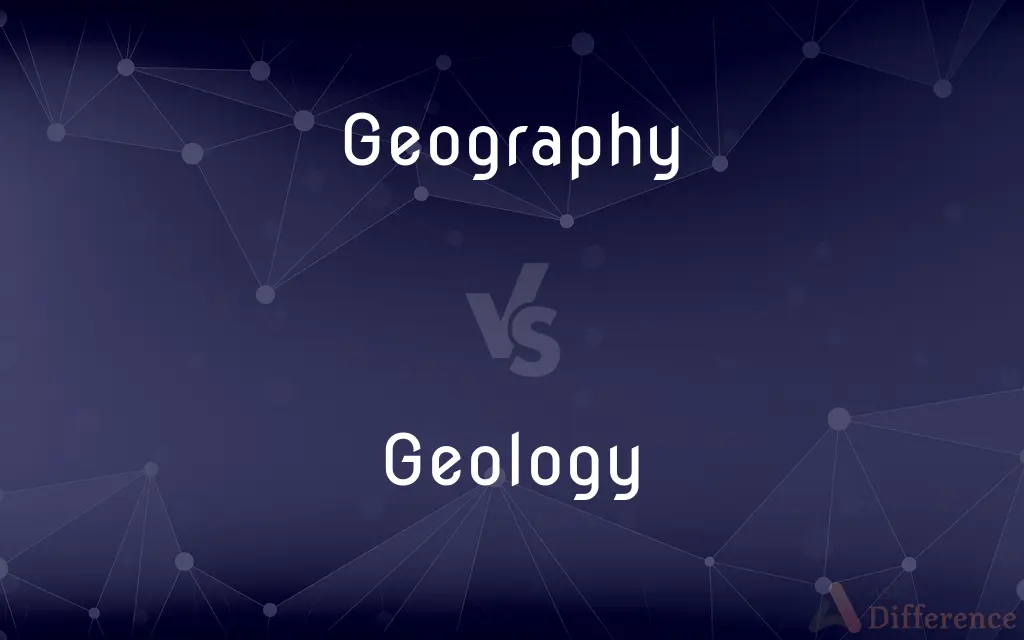Geography vs. Geology — What's the Difference?
By Tayyaba Rehman & Maham Liaqat — Updated on March 14, 2024
Geography studies the Earth's landscapes, environments, and relationships between people and their environment, focusing on spatial distribution, while geology examines the Earth's physical structure, history, and processes, emphasizing rocks and Earth.

Difference Between Geography and Geology
Table of Contents
ADVERTISEMENT
Key Differences
Geography is the science that deals with the study of the Earth and its lands, features, inhabitants, and phenomena. It is divided into two main branches: human geography, which focuses on the study of human activities, cultures, and their relationship with the environment, and physical geography, which concerns itself with the natural features of the Earth, such as landscapes, climates, and ecosystems. Geology, on the other hand, is the science that examines the Earth's physical structure and substance, its history, and the processes that act upon it.
Geography seeks to understand where things are found, why they are there, and how they develop and change over time. Geologists study rock formations, minerals, and the processes that have shaped the Earth's surface and interior over millions of years, such as volcanism, erosion, and plate tectonics. Geology often provides insights into the past climate of the Earth, the evolution of life, and the age of the Earth itself.
While geography often considers the spatial relationships and patterns on the Earth's surface, including human-environment interactions, geology delves into the Earth's materials, the processes by which they are formed, and their arrangement and history. Geography's scope is broader in one sense, encompassing human societies and natural environments, whereas geology offers a deeper dive into the Earth's physical processes and history.
Both disciplines are interconnected and complement each other. Geographers may use geological information to understand landscape formation and environmental processes, while geologists may consider geographical factors when studying rock formations or environmental geology. Together, they provide a comprehensive understanding of the Earth's systems, their history, and how humans interact with these natural processes.
Comparison Chart
Focus
Earth's surface, environments, human-environment interaction
Earth's physical structure, processes, history
ADVERTISEMENT
Main Branches
Human geography and physical geography
Petrology, mineralogy, sedimentology, paleontology
Concerns
Spatial distribution, patterns, and changes on Earth's surface
Composition, structure, and history of Earth's materials
Methods
Mapping, spatial analysis, field observations
Rock sampling, dating methods, seismic analysis
Applications
Urban planning, environmental management, geopolitics
Natural resource exploration, environmental assessment, paleoclimate studies
Compare with Definitions
Geography
Utilizes tools like GIS for spatial analysis.
Geographic Information Systems (GIS) are used to map disease outbreaks.
Geology
Focuses on the study of minerals, rocks, and fossils.
Mineralogists analyze rock samples to identify valuable minerals.
Geography
The study of places and the relationships between people and their environments.
Geographers analyze the impact of climate change on human settlements.
Geology
Investigates the processes that have shaped the Earth over geological time.
The study of volcanism reveals how islands and mountains form.
Geography
Examines both physical landscapes and human societies.
Physical geographers investigate the processes that shape the Earth’s surface.
Geology
Applies knowledge to find natural resources.
Petroleum geologists locate oil and gas deposits.
Geography
Aims to understand global and local systems.
Geographers explore the globalization effects on local economies.
Geology
Helps understand past climates and environments.
Paleontologists study fossils to reconstruct ancient ecosystems.
Geography
Focuses on spatial distribution and patterns of natural and human phenomena.
Urban geographers study the spatial layout of cities.
Geology
Geology (from the Ancient Greek γῆ, gē ("earth") and -λoγία, -logia, ("study of", "discourse")) is a branch of Earth science concerned with the solid Earth, the rocks of which it is composed, and the processes by which they change over time. Geology can also include the study of the solid features of any terrestrial planet or natural satellite such as Mars or the Moon.
Geography
Geography (from Greek: γεωγραφία, geographia, literally "earth description") is a field of science devoted to the study of the lands, features, inhabitants, and phenomena of the Earth and planets. The first person to use the word γεωγραφία was Eratosthenes (276–194 BC).
Geology
The science which deals with the physical structure and substance of the earth, their history, and the processes which act on them.
Geography
The study of the physical features of the earth and its atmosphere, and of human activity as it affects and is affected by these, including the distribution of populations and resources and political and economic activities.
Geology
The scientific study of the origin, history, and structure of the earth.
Geography
The study of the earth and its features and of the distribution of life on the earth, including human life and the effects of human activity.
Geology
The structure of a specific region of the earth's crust.
Geography
The physical characteristics, especially the surface features, of an area.
Geology
A book on geology.
Geography
A book on geography.
Geology
The scientific study of the origin, history, and structure of the solid matter of a celestial body.
Geography
An ordered arrangement of constituent elements
Charting a geography of the mind.
Geology
The science that studies the structure of the earth (or other planets), together with its origin and development, especially by examination of its rocks.
Geography
A description of the earth: a treatise or textbook on geography
Geology
The geological structure of a region.
The geology of the Alps.
Geography
An atlas or gazetteer.
Geology
The science which treats: (a) Of the structure and mineral constitution of the globe; structural geology. (b) Of its history as regards rocks, minerals, rivers, valleys, mountains, climates, life, etc.; historical geology. (c) Of the causes and methods by which its structure, features, changes, and conditions have been produced; dynamical geology. See Chart of The Geological Series.
Geography
The study of the physical properties of the earth, including how humans affect and are affected by them.
Geology
A treatise on the science.
Geography
Terrain: the physical properties of a region of the earth.
Geology
A science that deals with the history of the earth as recorded in rocks
Geography
Any subject considered in terms of its physical distribution.
Geology
The science of the Earth’s physical structure and substance.
Geologists study rock formations to understand the Earth’s history.
Geography
Similar books, studies, or regions concerning other planets.
Geography
The physical arrangement of any place, particularly a house.
Geography
The lavatory: a room used for urination and defecation.
Geography
The relative arrangement of the parts of anything.
Geography
A territory: a geographical area as a field of business or market sector.
Geography
The science which treats of the world and its inhabitants; a description of the earth, or a portion of the earth, including its structure, features, products, political divisions, and the people by whom it is inhabited. It also includes the responses and adaptations of people to topography, climate, soil and vegetation
Geography
A treatise on this science.
Geography
Study of the earth's surface; includes people's responses to topography and climate and soil and vegetation
Common Curiosities
Can geography and geology overlap in their studies?
Yes, they often overlap, especially in areas like environmental geography and geomorphology, where understanding the physical landscape is crucial.
What tools do geographers use?
Geographers use tools like GIS (Geographic Information Systems), remote sensing, and spatial analysis to study patterns and processes on the Earth's surface.
How do geologists date rocks?
Geologists use radiometric dating methods, analyzing the decay of radioactive isotopes within minerals to determine the age of rocks.
What role does geography play in climate change research?
Geography provides insights into how climate change affects natural and human systems, aids in vulnerability assessments, and helps in planning mitigation and adaptation strategies.
What is the importance of studying geology?
Studying geology is crucial for understanding the Earth’s past, predicting geological hazards, exploring natural resources, and assessing environmental changes.
What is the significance of plate tectonics in geology?
Plate tectonics theory explains the movement of the Earth's lithospheric plates, accounting for phenomena like earthquakes, volcanic activity, and mountain building, which are central to understanding Earth's geology.
How do geographers and geologists contribute to environmental conservation?
Geographers might analyze human impact on the environment and plan sustainable developments, while geologists may assess natural hazards and resource management to mitigate environmental risks.
What is the main difference between geography and geology?
Geography focuses on the Earth's surface and human-environment interactions, while geology focuses on the Earth's physical structure and history.
How do human geography and physical geography differ?
Human geography studies human societies, their cultures, activities, and spatial dynamics, while physical geography focuses on the natural environment, including climate, landforms, and ecosystems.
What kind of careers might geographers and geologists pursue?
Geographers might work in urban planning, environmental consultancy, or GIS analysis. Geologists might work in resource exploration, environmental geology, or academia.
Share Your Discovery

Previous Comparison
Pantry vs. Kitchenette
Next Comparison
Cynophile vs. CynophobiaAuthor Spotlight
Written by
Tayyaba RehmanTayyaba Rehman is a distinguished writer, currently serving as a primary contributor to askdifference.com. As a researcher in semantics and etymology, Tayyaba's passion for the complexity of languages and their distinctions has found a perfect home on the platform. Tayyaba delves into the intricacies of language, distinguishing between commonly confused words and phrases, thereby providing clarity for readers worldwide.
Co-written by
Maham Liaqat














































